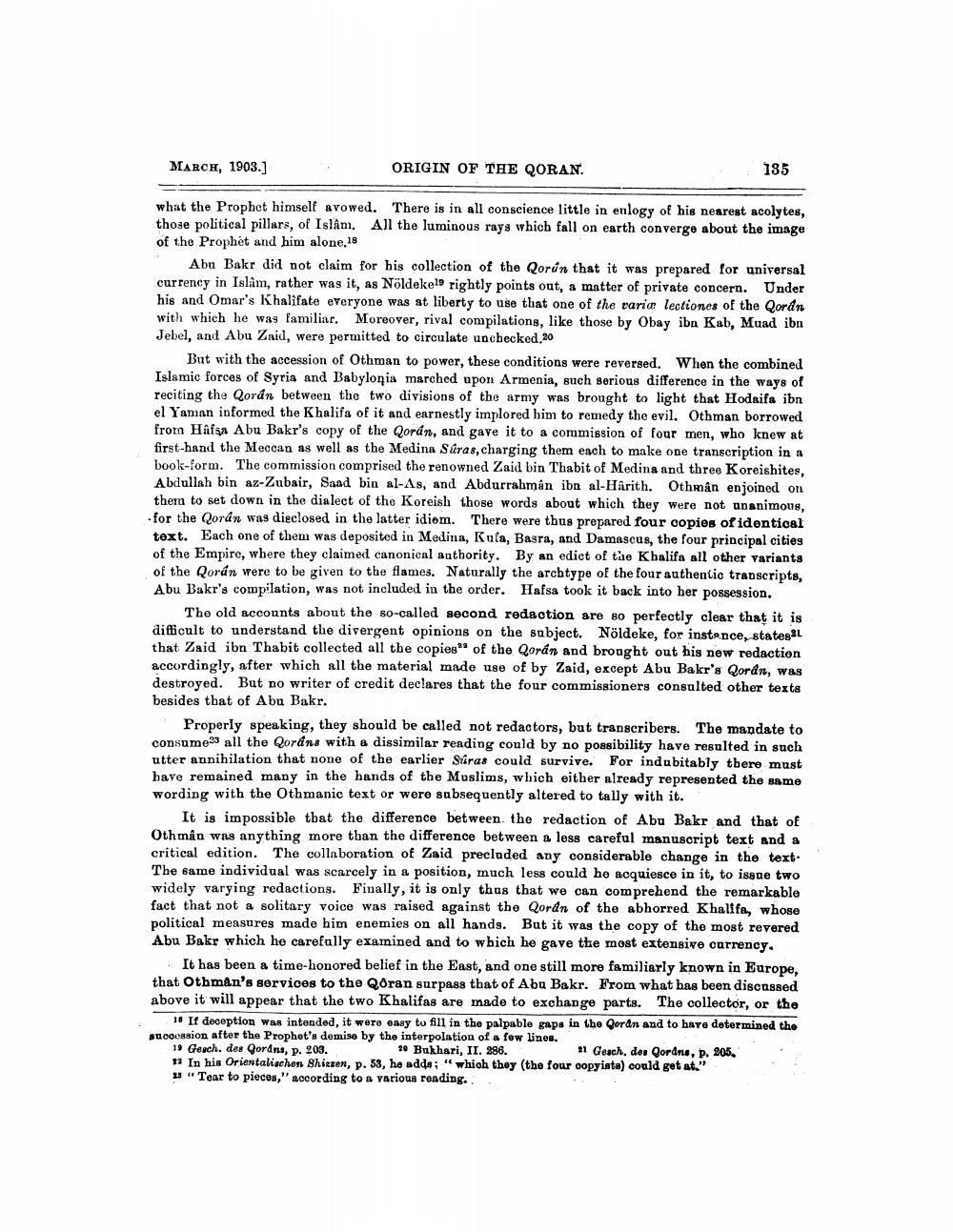________________
MARCE, 1903.]
ORIGIN OF THE QORAN.
135
what the Prophet himself avowed. There is in all conscience little in enlogy of his nearest acolytes, those political pillars, of Islam. All the luminous rays which fall on earth converge about the image of the Prophet and him alone.18
Abu Bakr did not claim for his collection of the Qorun that it was prepared for universal currency in Islam, rather was it, as Nöldekelo rightly points out, a matter of private concern. Under his and Omar's Khalifate everyone was at liberty to use that one of the varia lectiones of the Qordn with which he was familiar. Moreover, rival compilations, like those by Obay ibn Kab, Muad ibn Jebel, and Abu Zaid, were permitted to circulate unchecked. 20
But with the accession of Othman to power, these conditions were reversed. When the combined Islamic forces of Syria and Babylonia marched upon Armenia, such serious difference in the ways of reciting the Qorán between the two divisions of the army was brought to light that Hodaifs ibn el Yaman informed the Khalifa of it and earnestly implored him to remedy the evil. Othman borrowed from Hafsa Abu Bakr's copy of the Qorán, and gave it to a commission of four men, who knew at first-hand the Meccan as well as the Medina Súras, charging them each to make one transcription in a book-form. The commission comprised the renowned Zaid bin Thabit of Medina and three Koreishites, Abdullah bin az-Zubair, Saad bin al-As, and Abdurrahman ibn al-Harith. Othman enjoined on them to set down in the dialect of the Koreish those words about which they were not ananimous, for the Qorán was dieclosed in the latter idiom. There were thus prepared four copies of identical text. Each one of them was deposited in Medina, Kufa, Basra, and Damascus, the four principal cities of the Empire, where they claimed canonical authority. By an edict of te Khalifa all other variants of the Qorán were to be given to the flames. Naturally the arcbtype of the four authentic transcripts, Abu Bakr's compilation, was not included in the order. Hafsa took it back into her possession.
The old accounts about the so-called second redaction are so perfectly clear that it is difficult to understand the divergent opinions on the subject. Nöldeke, for instance, states&l that Zaid ibn Thabit collected all the copies" of the Qorán and brought out his new redaction accordingly, after which all the material made use of by Zaid, except Abu Bakr's Qoran, was destroyed. But no writer of credit declares that the four commissioners consulted other texts besides that of Abu Bakr.
Properly speaking, they should be called not redactors, but transcribers. The mandate to consume all the Qordns with a dissimilar reading could by no possibility have resulted in such utter annihilation that none of the earlier Stras could survive. For indubitably there must have remained many in the hands of the Muslims, which either already represented the same wording with the Othmanic text or were subsequently altered to tally with it.
It is impossible that the difference between the redaction of Abu Bakr and that of Othman was anything more than the difference between a less careful manuscript text and a critical edition. The collaboration of Zaid precluded any considerable change in the text. The same individual was scarcely in a position, much less could he acquiesce in it, to isane two widely varying redactions. Finally, it is only thus that we can comprehend the remarkable fact that not a solitary voice was raised against the Qoran of the abhorred Khalifa, whose political measures made him enemies on all hands. But it was the copy of the most revered Abu Bakr which he carefully examined and to which he gave the most extensive currency.
It has been a time-honored belief in the East, and one still more familiarly known in Europe, that Othman's services to the Qoran surpass that of Abu Bakr. From what has been discussed above it will appear that the two Khalifas are made to exchange parts. The collector, or the
13 If deception was intended, it were easy to fill in the palpablo gaps in the Qorån and to have determined the uoooasion after the Prophet's demise by the interpolation of a fow lines. 19 Gesch. des Qorans, p. 203.
30 Bukhari, II. 286.
11 Gesch, der Qordns, p. 205, 12 In his Orientalischen Shizzen, p. 53, he adde;" which they (the four copyista) could get at." 21 "Tear to pieces, according to a various reading.




